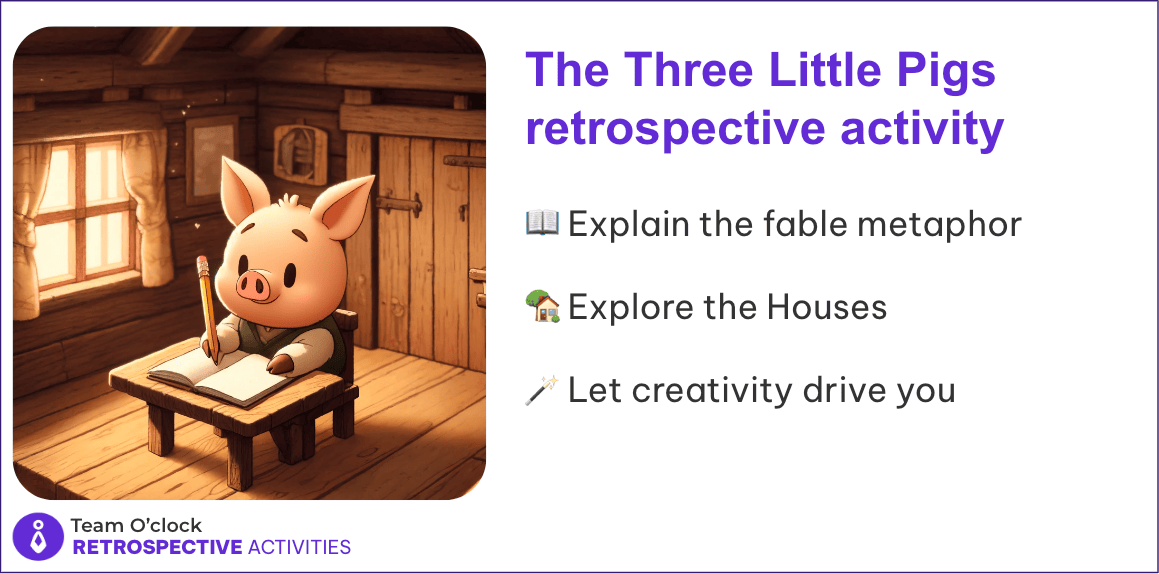
How the 3 Little Pigs Retrospective Template Makes Agile Efficient

The retrospective meeting offers a unique opportunity for an Agile team to strengthen bonds, enable team growth, and cultivate alignment. As Agile and Scrum methodologies evolve, so do the practices within the retrospective meeting.
Many retrospective activities facilitate these meetings and encourage collaboration and engagement. One of the most effective ones is the "3 Little Pigs" retrospective activity. It stands out for its unique approach, leveraging a beloved childhood tale to drive insightful discussions.
Let's break down how this template can maximize the effectiveness of your Agile retrospectives, fostering growth, collaboration, and innovation within your team.
What is the 3 Little Pigs Retrospective Template?
Originating from the timeless tale of the three little pigs, this retrospective template infuses whimsy and depth into the process of reflection. The template revolves around three metaphorical "houses" representing different facets of the sprint or project: straw, stick, and brick.
These houses symbolize aspects of the sprint that went well, areas that faced challenges, and lessons learned, respectively. By exploring each house, teams uncover insights that drive meaningful improvements.
Benefits of Using the 3 Little Pigs Retrospective Template
The benefits of this template extend to Agile teams, SCRUM masters, product owners, and stakeholders alike. Fostering open dialogue and reflection promotes team collaboration, transparency, and accountability. Each member gains a deeper understanding of the project's dynamics, enabling them to contribute more effectively to its success.
How to Implement the 3 Little Pigs Retrospective Template
Implementing the 3 Little Pigs retrospective is a straightforward yet powerful process:
Set the Stage: Introduce the metaphorical houses and their significance, setting the tone for open discussion and reflection.
Explore the House: Guide the team through each house, prompting them to add notes on each house based on how strong or weak the remark they make is for the team. A weak point should be placed in the House of Straw, while a strong point or team success in the House of Bricks. House of Wood is for notes that dictate areas that are working but need further improvement.
Gather Insights: Encourage team members to openly share their perspectives and insights, fostering a collaborative and fair environment.
Facilitate Discussion: Facilitate an open dialogue, ensuring all voices are heard and insights are thoroughly explored.
What Are the Challenges and Opportunities?
While the "Three Little Pigs" retrospective activity offers several opportunities, such as engaging team members through storytelling and facilitating discussions playfully, it also presents some challenges.
3 Challenges to Keep in Mind:
Interpretation: Ensuring all team members understand the metaphor and its relevance to the project or sprint might be challenging. Some participants may struggle to draw parallels between the story and their work experiences.
Lack of Focus: The open-ended nature of each section can lead to a wide range of topics being brought up. As a result, this might make it challenging to focus on specific areas for improvement and develop solutions efficiently.
Participation: Not all team members may feel comfortable or engaged with the playful approach. Introverted or less creative team members might struggle to contribute meaningfully to the discussion.
3 Opportunities to Keep in Mind:
Creativity and Engagement: The "Three Little Pigs" retrospective provides a fun and engaging way to conduct the meeting, encouraging creativity and active participation from team members. It can help break the monotony of traditional retrospective formats.
Shared Understanding: By using a familiar story as a metaphor, team members can develop a shared understanding of the project's challenges and successes. This shared narrative can facilitate deeper discussions and alignment on improvement strategies.
Problem-Solving: The story's narrative structure can guide the team through identifying problems, analyzing their root causes, and brainstorming potential solutions. It can spark innovative thinking and fresh perspectives on recurring issues.
Overall, the "Three Little Pigs" retrospective offers a creative and engaging approach to conducting retrospectives. However, it's essential to address potential challenges and ensure that all team members feel included and able to contribute effectively.
Expert Tips for Maximizing the 3 Little Pigs Retrospective
If you aim to enhance the impact of the 3 Little Pigs retrospective, it's essential to focus on the following expert tips:
Encourage Active Participation: Establishing a safe and inclusive environment is crucial for fostering active participation. Motivate team members to share their successes, challenges, and concerns. For instance, you can begin the retrospective by inviting each participant to share a "straw," representing a minor challenge, and a "brick," symbolizing a significant obstacle faced during the sprint. This exercise sets the stage for open dialogue and encourages individuals to participate without fear of judgment.
Focus on Actionable Insights: While reflecting on the sprint's experiences is valuable, it's equally essential to identify actionable insights that can drive meaningful improvements. For example, after discussing the story's parallels to the team's challenges and successes, facilitate a brainstorming session to generate specific action items. Encourage team members to prioritize these actions based on their perceived impact and feasibility, ensuring they leave the retrospective with a clear roadmap for implementing positive changes in the upcoming sprint.
Promote Open Communication: Open communication is the cornerstone of effective retrospectives. Beyond simply sharing their experiences, team members should feel empowered to engage in constructive dialogue and provide feedback to their peers. To promote this culture of openness, consider incorporating structured communication exercises into the retrospective, such as a "feedback circle" where each participant offers both praise and constructive criticism to another team member. By fostering a climate of mutual respect and trust, you create an environment where everyone's voice is heard and valued, ultimately leading to more productive and insightful discussions.
Takeaway

The 3 Little Pigs retrospective template offers a whimsical yet powerful approach to fostering continuous improvement within Agile teams. By leveraging this template, teams can deepen their understanding of their processes, identify areas for improvement, and ultimately enhance their performance and productivity. Embrace the spirit of reflection and growth, and witness the transformation towards innovation and success.
Try it out and integrate the 3 Little Pigs retrospective into your Agile activities. Share your experiences, and together, let's unlock new levels of collaboration, learning, and achievement.








